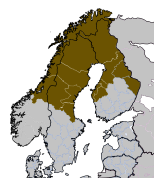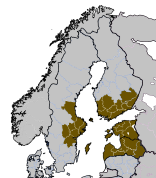Interreg programmes 2021–2027
The programmes of the European Territorial Cooperation (ETC) goal, i.e. the Interreg programmes, are part of the EU's regional and structural policy.
Interreg programmes support the integration of border areas and wider, cross-border cooperation areas, as well as the creation and strengthening of networks between regions and cities. By increasing cooperation, promoting the exchange of experiences and spreading good practices, the programmes affect the competitiveness and economic development of regions. The programmes also promote environmental goals in accordance with the European Green Deal.
In addition, the programmes strengthen the Baltic Sea region as a European and global economic area and look for joint solutions to the challenges of northern sparsely populated areas.
Finland participates in the implementation of eight Interreg programmes in the 2021–2027 programming period.
In the 2014–2020 programming period, Finland participated in three ENI CBC external border cooperation programs: Karelia, Kolarctic and Southeast Finland – Russia. The implementation of the programmes by beneficiaries will continue until the end of 2023. The programmes will be closed at the beginning of 2025.
Interreg programmes operating in Finland
Cross-border cooperation programmes
Total funding: 205.6 million euros

EU funding: 125.3 million euros
Norwegian funding: 12.8 million euros
Programme area: Finland (Lapland, North Ostrobothnia, Central Ostrobothnia, Ostrobothnia, South Ostrobothnia, North Karelia, Kainuu), Sweden (4 regions) and Norway (3 regions)
Administrative authority: Länsstyrelsen Norrbotten (Luleå, Sweden)
The secretariat operates in multiple locations in the programme area. In Finland, the members of the secretariat are located at the Council of Lapland, the Regional Council of North Ostrobothnia, the Regional Council of Ostrobothnia and the Sámi Parliament.
Interreg Aurora enables new opportunities for cross-border cooperation in the northernmost re-gions of Europe and the Sápmi area. A special feature of Interreg Aurora is the integration of the programme into the Sápmi area and the participation of the indigenous Sámi peoples. Interreg Aurora is a new programme that combines the Interreg Botnia-Atlantica and Interreg Nord programmes of the 2014–2020 programming period.
Total funding: 203.1 million euros

EU funding: 162.5 million euros
Programme area: Finland (Satakunta, Southwest Finland, Uusimaa, Kymenlaakso, Pirkanmaa, Kanta-Häme, Päijät-Häme, South Karelia, Åland, South Savo), Sweden (8 regions), Estonia, Latvia (6 regions)
Managing Authority and Joint Secretariat: Council of Southwest Finland (Turku, Finland)
Interreg Central Baltic 2021–2027 finances cross-border cooperation projects in Finland (including Åland), Estonia, Latvia and Sweden. Programmes have been implemented in the region since 2007 and cooperation networks are well-established and developed. The Baltic Sea has connected countries for centuries, creating the basis for strong economic and cultural relations.
The programme area has been transformed into a functioning cross-border cooperation area, where the aim is to improve the area's operational capacity and to solve challenges that unite the areas - together across borders. More detailed descriptions of the activities to be financed and information about the open calls for proposals can be found on the programme's website.
Total funding: 317.4 million euros
EU funding: 251 million euros
Norwegian funding: 3.7 million euros
Programme area: Finland, Sweden, Estonia, Latvia, Lithuania, Poland, Denmark, Germany (7 states), Norway (9 regions)
Managing Authority and Joint Secretariat: Investitionsbank Schleswig Holstein (Rostock, Germany)
The Interreg Baltic Sea Region 2021-2027 programme is a cooperation programme between the states of the Baltic Sea region. The programme area is geographically wide and there are numerous European metropolitan areas within it, but on the other hand, the vast majority of the programme area is rural.
The goal of the programme is to promote the green transition and resilience of the Baltic Sea region and to improve the quality of life of the region's residents. More detailed content descriptions of the goals and contents of the funded projects by priority can be found on the programme's website.
In addition, the programme plays a key role in the implementation of the EU Strategy for the Baltic Sea Region.
Total funding: 75 million euros
EU funding: 43.7 million euros
Norwegian, Icelandic, Faroese and Greenlandic funding: EUR 7.8 million
Programme area: Finland (Lapland, North Ostrobothnia, Kainuu, North Karelia, Central Ostrobothnia, Central Finland, North Savo, South Savo), Sweden (4 regions), Ireland (4 regions), Norway (3 area), Iceland, Faroe Islands, Greenland
Managing Authority: Länsstyrelsen Västerbotten (Umeå, Sweden)
Joint Secretariat: Copenhagen, Denmark
The Northern Periphery and Arctic Region programme creates cooperation between seven partner countries. This means that the programme area covers the Euro-Arctic zone, parts of the Atlantic belt and parts of the Barents region, bordering Canada in the west and Russia in the east. Despite the geographical differences, the large programme area shares a number of common features, such as low population density, low accessibility, low economic diversity, abundant natural resources, and high impact of climate change. This unique combination of characteristics means common challenges and opportunities that are best handled through transnational cooperation.
Total funding: 482.3 million euros
EU funding: EUR 384.5 million
Funding from other countries: 2.9 million euros
Programme area: European Union, Norway, Switzerland, Ukraine, Moldova, Albania, Bosnia and Herzegovina, Montenegro, North Macedonia, Serbia
Managing Authority and Joint Secretariat: Region Hauts-de-France (Lille, France)
The Interreg Europe programme offers funding to regional and local governments to develop and implement better regional policy throughout Europe. The goal is to improve the implementation of regional development by promoting the exchange of experiences, innovative approaches and good practices among regional policy actors.
The operation and financing of the programme is carried out through cooperation projects between regions and the knowledge platform (Policy Learning Platform). Cooperation projects between regions comprise two phases; the actual implementation phase (3 years) and the monitoring phase (1 year). The expertise platform functions as an information centre and offers information on previous projects, expert support and networking assistance.
Total funding: EUR 58 million
EU funding: 45 million euros
Norwegian and Swiss funding: EUR 0.16 million
Programme area: European Union, Norway, Switzerland
Managing Authority and Joint Secretariat: Bratislava Region (Bratislava, Slovakia)
Interact is a common support function for Interreg programmes that offers services for all EU cross-border cooperation programs. Interact strives to ensure the consistent operation of the programmes by sharing the latest information and best practices, organizing training and networking events, building and developing joint tools, and producing publications and reports related to current needs. In Finland, Interact's office is located in Turku.
Total funding: EUR 61.7 million
EU funding: 48 million euros
Norwegian, Swiss, Icelandic and Liechtensteinian funding: 1.7 million euros
Programme area: European Union, Norway, Switzerland, Iceland, Liechtenstein
Managing Authority: Ministry of Energy and Spatial Planning of Luxembourg
Responsible for implementation: ESPON EGTC (Luxembourg)
The goal of the ESPON (European Observation Network for Territorial Development and Cohesion) research programme is to improve the information base of regional planning and regional development and to support cooperation between EU countries in these fields. All EU member states and partner countries Norway, Iceland, Switzerland and Liechstenstein participate in the programme. The programme is implemented with projects involving research institutions from different parts of Europe.
Total funding: EUR 109.9 million
EU funding: 86.8 million euros
Programme area: European Union, Norway, Switzerland, Ukraine, Moldova, Albania, Bosnia and Herzegovina, Montenegro, North Macedonia, Serbia
Managing Authority and Joint Secretariat: French National Agency for Territorial Cohesion (Par-is, France)
The goal of the URBACT programme is to gather and spread good experiences of urban development through experience exchange networks, increase mutual learning between cities and strengthen urban development know-how. The URBACT programme is a tool for cities to participate in networking and exchange experiences on various themes of integrated urban development with other European cities.

